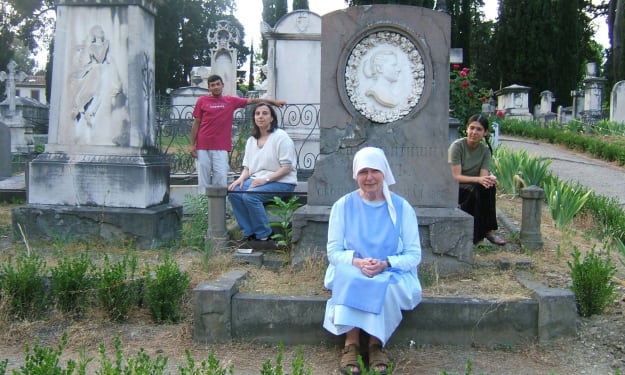Gossip Girl
Gossip can hurt feelings but is also an essential human interaction

As I walked in the door of my tiny apartment, the phone was ringing. I grabbed it before the answering machine cut in. I was breathless from running up the flight of stairs.
“Hello?”
“I heard everything you said about me. It was all recorded. I can’t believe you would say those things about me,” said the woman on the other end.
“Jackie?” I asked.
“Who else do you think it is?” she demanded. “I am just so hurt by what you said.”
“Jackie, what are you talking about?” I asked.
“That conversation you had with your friend. I heard every word. It’s recorded on my answering machine. I’ve been sitting here for the last half hour playing it over and over.”
But she couldn’t have heard that conversation, I thought. That was just between Jenny and me. Had taken place in the office at work. The only way she could know about it was if …
And then I knew. The phone at work. It didn’t disconnect when you put the receiver down into the cradle. You had to push the disconnect button. And I’d forgotten to push it.
I worked at a bed and breakfast in Boulder as a hostess to help pay my way through college. My friend Jenny had stopped in to see me and she'd found me in the upstairs office. She was from the East Coast and had taken a short break for a few months. Jenny had decided to extend her stay for a year and see if she wanted to move to Colorado permanently. She came by to visit me and see if I knew of any available apartments she could rent. Boulder is a college town, but luckily she’d come in the summer when there were numerous vacancies until students returned in the fall.
I’d told her I knew of a place in the complex where I lived, five small houses with a mix of studio and one-bedroom units, and a spacious garden that ran for a full block behind. Jenny asked me about living there, how I enjoyed it and how I got along with the neighbours.
“Oh, the neighbours are great,” I said. Several of them had become friends and we often dropped into each other’s places in the evenings or on the weekends for a chat or to share a glass of wine and dinner. The only person in the complex that people didn't like was Jackie.
Jackie was the resident manager. She was a difficult personality to get along with. My neighbours and I had frequent gossip sessions where we mutually complained and shared stories about her. Her main crime (in our eyes) was that she was too severe about enforcing rules and never showed the tenants any flexibility. If our rent was even one day late, we had to pay a penalty. She would call or drop by if you had guests to remind you to keep voices down after 10 pm, even if it was the residents hanging out together. When I got home one night, my key broke off in the lock to my front door. Jackie wanted me to wait until morning to get a locksmith (as it was cheaper) and stay with a friend overnight. I had to insist she call a 24-hour locksmith.
She seemed to enjoy lording her job over us. We knew she had to enforce the rules, but we felt the responsibility had gone to her head. She was abrasive and blunt.
Once, she asked me if a male friend of mine in the complex was single. I told her I was interested in him myself in a romantic way. "Well," she replied, "He doesn't have a ring on his finger so he's fair game." My friend told me later she had gone to his apartment that night with a bottle of wine, but he made it clear he wasn't interested in her. When he and I did get together (briefly), Jackie made a point of telling me negative things about him, a sour grapes kind of move.
When I saw a stray cat hanging around the compound, she told me she would waive the pet deposit if I adopted the animal, which I did. She later tried to charge me the deposit retroactively.
I told Jenny to call Jackie and ask her about the vacancy. Jenny used the phone in the office, got the answering machine, left a message and then hung up. Or thought she did. I forgot to push the button that disconnected the call and everything we said next was recorded on Jackie’s machine.
What I told Jenny in that office chat was all the stories I’d heard from the other neighbours and that most of us didn’t like the manager and why. And Jackie heard every word.
She waited until she knew I'd be getting home from work and called me.
When I realised what had happened, I actually felt mildly nauseous. I’d been gossiping about Jackie behind her back. I couldn’t deny what I’d said, as she literally had a record of it. I had to face the fact that she knew exactly what I’d said. I couldn't wiggle out of this one. As Jackie continued to talk, I also realised, with shame and regret, that I’d really hurt her. I didn’t like thinking of myself as someone who hurt people.
I remember just listening to Jackie and taking a lot of deep breaths. The experience was a powerful lesson for me. I couldn’t lie or bluff my way out of this trouble. I had to accept responsibility and try to make amends for the damage that I’d done. I apologized to Jackie, and I meant every word. I was squirming and physically uncomfortable. Dimly in my head a voice was saying, “This is a good lesson for you about gossiping.”
“Jackie, I’m really sorry that you had to find out this way and I’m sorry I didn’t tell you these criticisms in person," I said.
“You can forget about your friend living here,” said Jackie. “Tell her not to even bother applying.”
“Look, I’m the one that hurt your feelings. She didn’t have anything to do with it. Please don’t blame her,” I said, but Jackie was adamant.
I knew she was lashing out because she was hurt, but that seemed childish. Then she told me she’d played the message more than 30 times and suddenly I realized that no amount of apology was going to make up for this. I wasn’t off the hook, but I suddenly had an insight that she was dragging the whole event out more than necessary. Who knew what personal issues I'd triggered in her?
We’d been on the phone for perhaps an hour, and she kept wanting to analyze everything I’d said to Jenny. But we were going around in circles. I’d apologized and meant it. Dragging things out was starting to become, well, neurotic. I was actually starting to get annoyed.
I finally said, “Look, we can talk this out all night, but it won’t change the facts. I said some hurtful things you weren’t supposed to hear. I feel really bad about that and I am genuinely sorry. But I think we need to try and move on. We’re going to have to find a way to be able to relate to each other.”
I think she may have hung up on me then.
Our relations became frosty, and I avoided her as much as possible. Things remained uncomfortable between us until I moved out a year later. But I didn’t beat myself up about it – I had genuinely felt remorseful and I had made a heartfelt apology, and I really did learn a lesson (and it wasn’t to check the disconnect button on the phone.) Jackie may not have been the nicest person, but noone deserves to be hurt by hearing gossip about themselves.
For a long time after this incident, I refrained from gossiping and if I heard gossip, I made sure it stopped with me. I knew too well how hurtful words could be. I tried telling the subjects of gossip that people were talking about them, but that usually backfired. People really do shoot the messenger. I learned that when you try to “fix” a situation this way, you often make things worse. That's not really the point of gossip anyway.
Because of the experience I’d had with Jackie, I read the book Grooming, Gossip and the Evolution of Language, by Robin Dunbar, and learned that language may even have evolved to facilitate gossip and share information about people in a community. That gossip has a role to play in maintaining social order and cohesion.
Gossip bonds people in a shared experience and can be an outlet when people can’t act against the real source of their anger or frustration, like a boss or a teacher, or where confronting someone with your feelings might irreversibly change the relationship. To varying extents, we all want to retain our positive illusions about ourselves and how others see us. In addition, when someone gossips, they may also be sharing secrets that they don’t want passed on.
Despite my past attempts at reforming, I can't escape gossiping and I'm not sure that I should. According to a Time article, one study showed that men spend 55% of a conversation gossiping and women 67%. "Talking about people who aren't present," said Megan Robbins, a psychologist and assistant professor, in the article,"is something that comes very naturally to us — an integral part of conversation, information sharing and even community building." Only about 15% of gossip is actually negative, apparently.
When I moved to Bali, I discovered that it is a culture rife with gossip, especially within the expat community. Gossip is social coin here. Right out of Dunbar’s book. People gossip to bond or make new friends, or to cement existing friendships. Often, it serves an important function and makes people aware of dangers or opportunities. Gossip in Bali is surprisingly accurate. For example, you may hear gossip about a potential paedophile who has been seen approaching children, and you warn your own kid to stay away from him, and you talk with the village headman. Or you hear about someone who has run out of money and is leaving Bali, so their rental house is available. Or you hear about someone who is isolated and possibly in a bad way emotionally or physically.
A while ago, a friend of mine was at the house of my extended family and heard them gossiping about me. I’d just had a confrontation with one of them, she was still angry and the talk was all negative.
My friend took me out for coffee to break the news. “What they were saying was pretty bad,” she said. “You need to know.”
But I had what I needed. I knew I had a good friend who cared about me. I knew that the family member would probably regret her gossiping later and would be uncomfortable if I confronted her. This had happened before when I tracked talk about me back to her. It would definitely affect our relationship and not for the better. I didn’t need the negativity in my life.
“You know what?” I replied. “I really don’t need to know. It’s just gossip. I’d rather not hear it.”
About the Creator
Liz Sinclair
Amateur historian who loves travel and lives in Asia. I write 'what-if' historical stories, speculative fiction, travel essays and haiku.
Twitter: @LizinBali. LinkedIn: sinclairliz






Comments
There are no comments for this story
Be the first to respond and start the conversation.